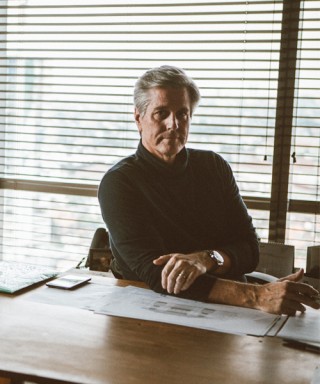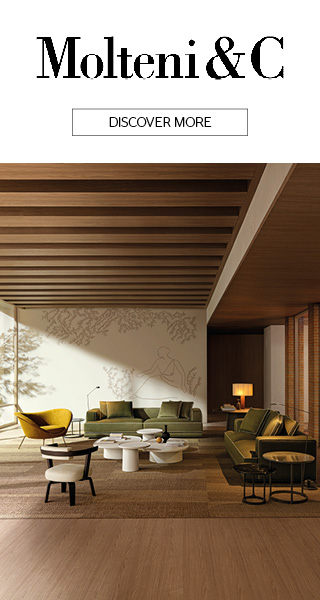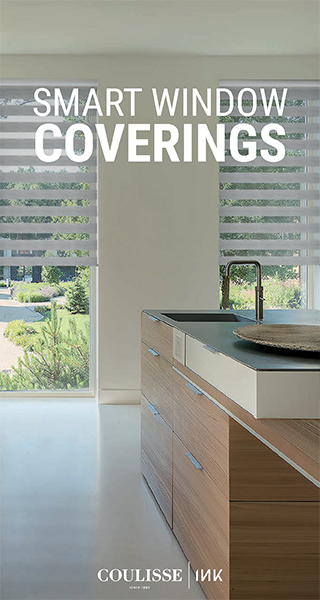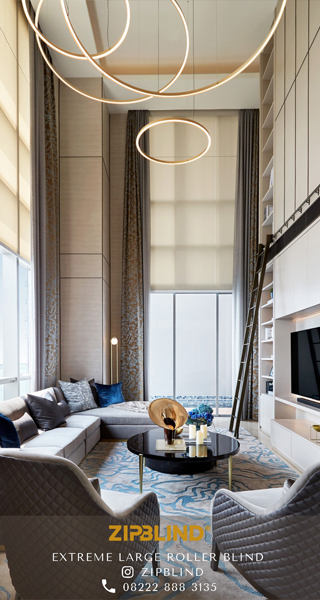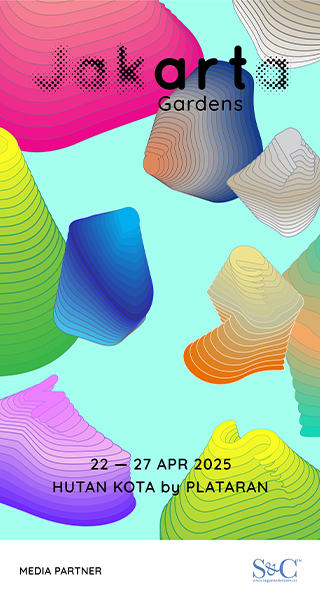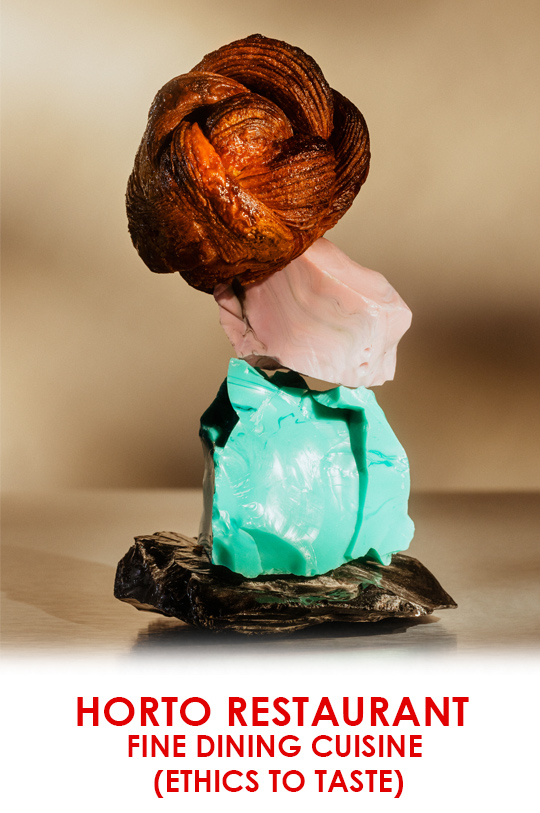
HORTO RESTAURANT – FINE DINING CUISINE (ETHICS TO TASTE)
Published by Sugar & Cream, Friday 28 October 2022
Images courtesy of Horto
Meet And Experience The Restaurant Guided By An Ethical Philosophy
The milanese restaurant Horto has officially opened. From the rooftop of the new, sustainably renovated and exclusive The Medelan building complex, Horto invites its guests to enjoy a multi-sensorial moment of relaxing evasion that elevates from the chaos of the metropolis, in the rediscovery of nature’s contact from the city centre. In its every component, from the cuisine, to the interiors, the outdoor landscape and the choice of its partners, Horto follows a direction of experimentation and sustainability, guided by a new philosophy that enhances the local, innovation and ethical balance.
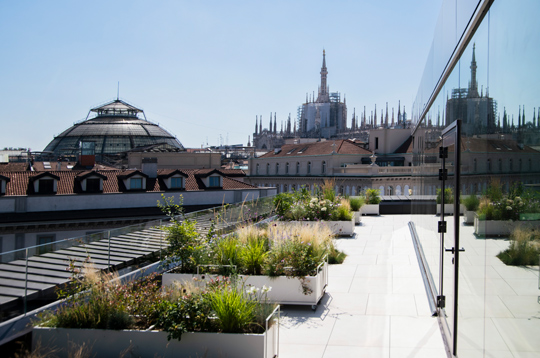
HORTO
Via San Protaso 5 (Milan, IT)
https://hortorestaurant.com
THE PHILOSOPHY
Horto was born from the desire to re-evaluate and give new definition to our relationship with time, the most precious possession. From nowadays noisy world, Horto’s co-founders Osvaldo Bosetti and Diego Panizza formulated the concept of the ethical hour, a philosophy that enhances the territory with a short supply chain and a model that proposes a new synergy between cuisine and territory, in a mutual relationship of knowledge and respect, believing that “everything can be found nearby”. Horto’s project exemplifies how different sectors can work together to build a sustainable ecosystem, in which partners are able to support each other and together build a higher quality of life.
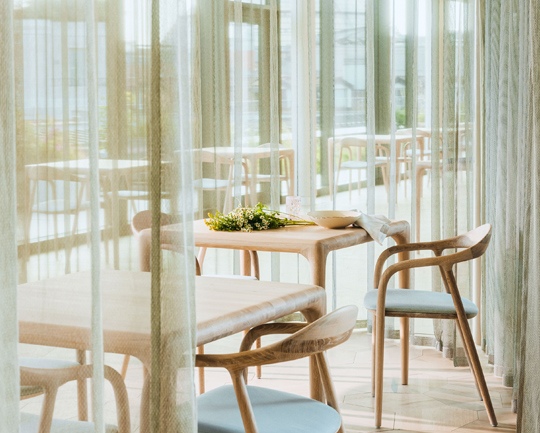
THE ETHICAL HOUR
Horto’s ethical hour has been translated into its every component, in particular: choice of strictly seasonal raw and local materials, collaboration with farms, dairies, and producers no more than one hour from the centre of Milan and who can organise themselves in a semi-consortium, arrangement of only one mean of transportation to regularly gather all the necessary stock from the suppliers, offer of exclusively lake fish and refined non-bottled water, furnishings and finishes made with natural and recycled materials (for example, the floor derives from old vinegar barrels, the wall plaster incorporates residuals from the rice processing and the structure of the internal walls is produced in a biodegradable material), uniforms made with recycled fabrics produced in collaboration with emerging realities and defined by Horto’s creative direction, lead by milanese agency Motel409, closing on Sundays in respect of the employees’ personal time.
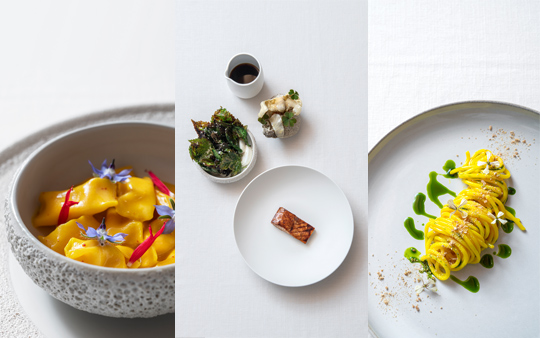
“The world keeps telling us that we need to change the way we approach everyday life and our relationship with time. Horto’s project wants to propose a new model, starting from this awareness, cuisine and the relationship with the local territory, a great but often forgotten wealth”, declare the co-founders Bosetti and Panizza.
HORTO’S KITCHEN
To fulfil the vision of the ethical hour, Horto’s co-founders entrusted the strategic and organisational direction of the kitchen to the three-Michelin Starred and Green Starred for Sustainability chef Norbert Niederkofler. Niederkofler has for many years been the pioneer of a sustainable philosophy regarding raw materials, the relationship with suppliers, the sourcing of ingredients and the rediscovery of an authentic, genuine and innovative cuisine, thus making him the perfect partner to translate Horto’s philosophy into culinary shape. In charge of the daily management of the restaurant is the Executive Chef and Head of Menu Development Alberto Toè, skilful interpreter of Niederkofler’s kitchen philosophy.
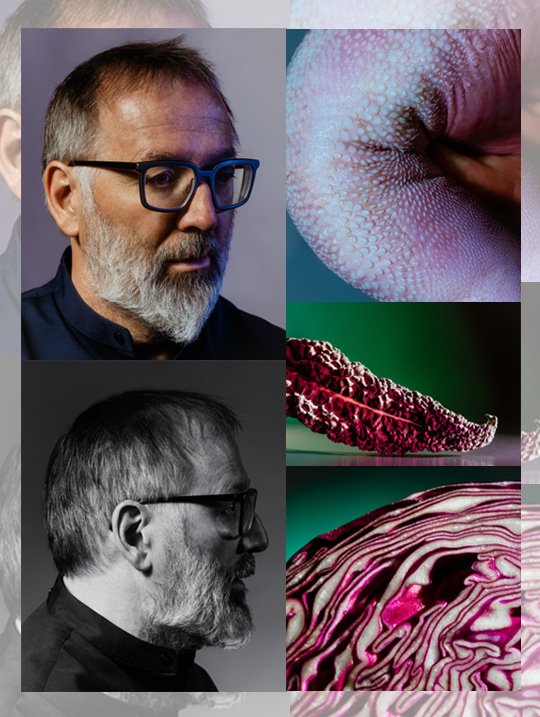
Norbert Niederkofler
“My sustainable approach was born with a specific goal: to find a balance with everything that surrounds us. I am thrilled to be part of this innovative project, a catalyst for respectful behaviour, in which every choice is guided by a shared ethical vision. Being able to find its application in the heart of Milan, focusing on local products and a short supply chain, is a source of pride”, explains Niederkofler.
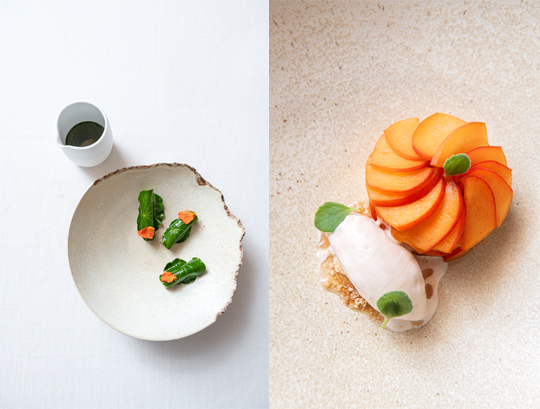
In line with the concept of the ethical hour, Horto works exclusively with the close-by territories, inviting its guests to rediscover the culinary richness offered by the local surroundings. Horto’s extended list of small suppliers involves partners that have a long history in the provision of pure and excellent materials in tune with nature. Just to name a few, some qualities of meat and dairies derive from Cirenaica in Robecchetto, the vegetables from Cascina Faschina at Abbiategrasso and Iside in Sulzano, the lake fish from Pescheria Montisola, the milk from Baronchelli in Lodi, the rice from Cavalieri d’Italia in Giussano, while the bread from Tondo in Milan.
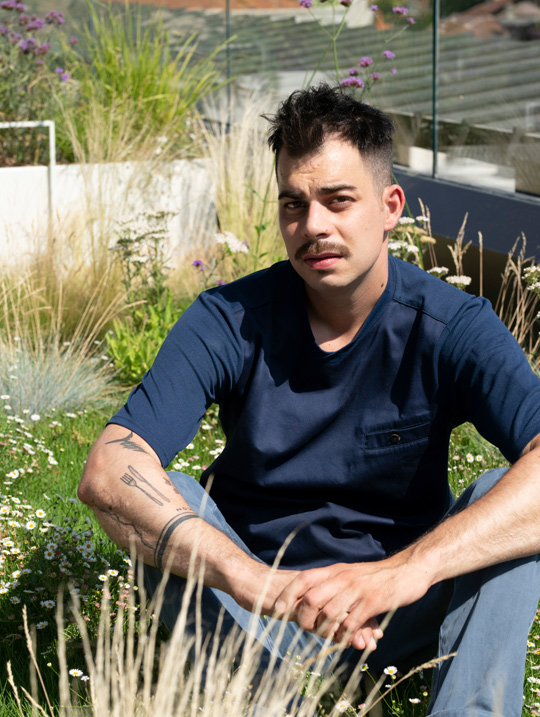
Alberto Toè
Toè has conceived dishes that reveal the taste of singular and uncommon ingredients, creating sophisticated and yet comforting combinations. “With Horto we are bringing an idea of cuisine that is dictated by what nature and the surrounding area offer, while enhancing the human involvement. Cuisine is in fact made of people and their stories; it is admirable to see nowadays young people wanting to innovate, starting right from where their grandparents left off. We operate with this concept in mind, while committing everyday to follow a practice of nowaste and give raw materials a new life” says Toè.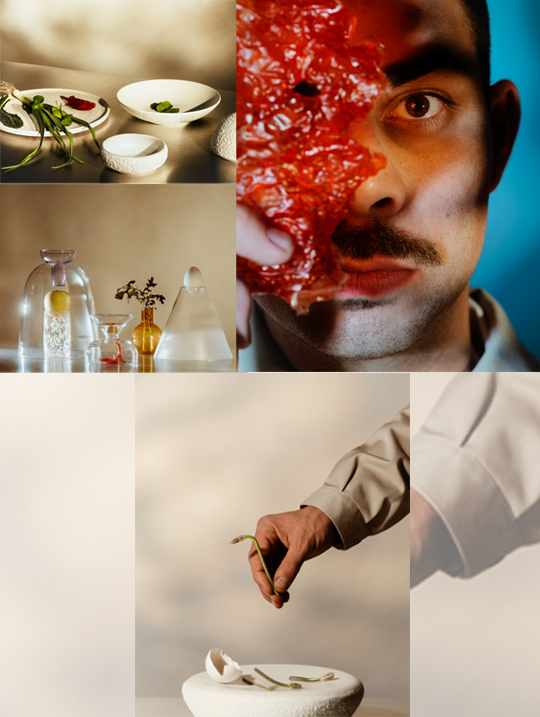
Horto’s dishes blend tradition with innovation, Italianness with international influences, simplicity with complexity. Some of them include the ‘Saffron Plin’, the ‘Char Tartare’, the ‘Tortelli with Potatoes and Elderflower’, the ‘Cow Belly’, and the ‘Shell Waffle’.
To accompany the dishes Horto proposes a selection of fine wines from international labels and small wineries, as well as infusions, decoctions, kombucha and non-alcoholic preparations to respond to multiple tastes.

Presented by Le Chateau Living
Horto’s offer embraces every moment of the day with a different and appropriate formula, starting from breakfast on the terrace, followed by lunch at the Sole Bistro, to the afternoon delicacies, to the aperitif on the rooftop of Milan, to finally end with the Horto Fine Dining experience for dinner.
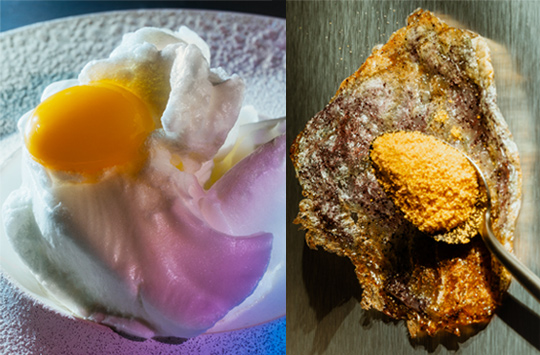
THE ENVIRONMENT
The environment of Horto, for both the interiors and exteriors, features a contemporary style in harmony with the tradition of the modern Milanese. The restaurant is located on the terrace of The Medelan, originally Palazzo Broggi designed by Giovanni Muzio at the end of the 1800s, which for years hosted the Credito Italiano HQs. The redevelopment of the entire complex was managed by GLA (Genius Loci Architettura) and is in the process of obtaining the Platinum sustainability certification (the most advanced level of the LEED system). Luisa Collina, Dean of the Design School of the Politecnico di Milano and coordinator of the entire project’s environment, has set up and developed the theme starting from the name Horto, a word that evokes realities and images that are very distant from the context in which we find ourselves, the heart of Milan.
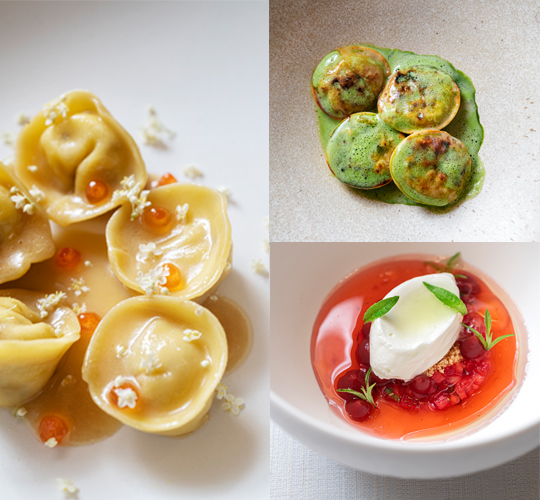
“And it is precisely from the dialogue between city and territory, from the quest to find balance between otium and negotium, between tradition and experimentation, that Horto takes shape”, declares Collina, a place where the culture of food, the environment, the service and the visual identity are offered in an integrated way, expressing themselves with the same tone of voice. One of the guiding principles for the creation of Horto is an idea of refinement that resonates with essence rather than appearance, with a particular attention to the quality of materials and details.
THE ENVIRONMENT: INTERIORS
GLA (Genius Loci Architettura), the architecture studio in charge of the interior design project as well as the renovation of the entire The Medelan complex, conceived Horto as an organic and enveloping environment. Focusing on a dreamlike vision suggested by this location of elevated pleasure, so close to the sky and far from the urban chaos, Horto presents organic and sinuous patterns, made with natural materials and colours creating an almost monochromatic fusion of space offering an ethereal, pure and enveloping environment with little visual pollution, where one can indulge in moments of conviviality.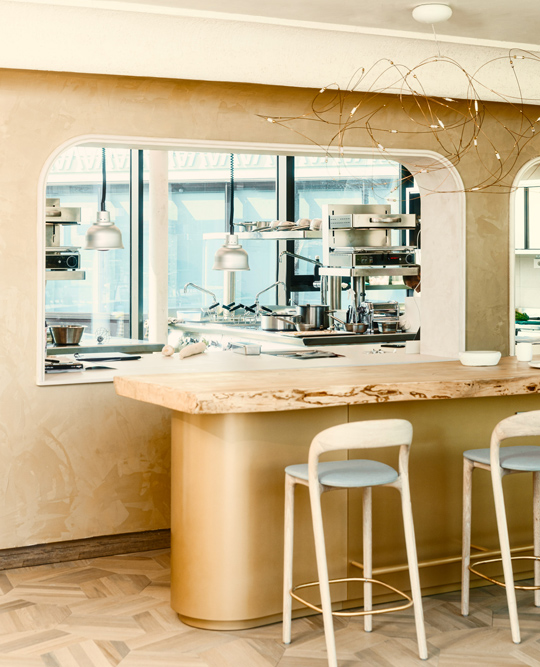
Alongside the dreamlike atmosphere, the cornerstone of the design choices was the search for materials that followed the principle of “zero waste” to reflect the chef’s philosophy in the design. The walls are covered with a rice plaster obtained by reusing the waste derived from the agricultural and industrial processing of such grain. The parquet, a typical Milanese finish, features a pattern breaking from classic designs, with each element made of recycled wood deriving from old vinegar factories. Considering the uniqueness of the terrace and the extended view over the whole of Milan, Collina and GLA have removed any boundary between the internal and external space through an entirely glass wall that surrounds the location, thus bringing the city of Milan up to Horto and making it the protagonist of the experience.
The space features a completely open floor plan, but has been organised in order to create different areas: intimate gatherings in the small interior alcoves, larger groups in the open main hall, or special celebrations in the outdoor green spaces.
The lights integrate themselves within the internal casing also through some luminous oculi, in a discreet and silent fashion. In line with the restaurant’s philosophy of transparency, the vast kitchen is visible to guests, who are able to see the stages of preparation.
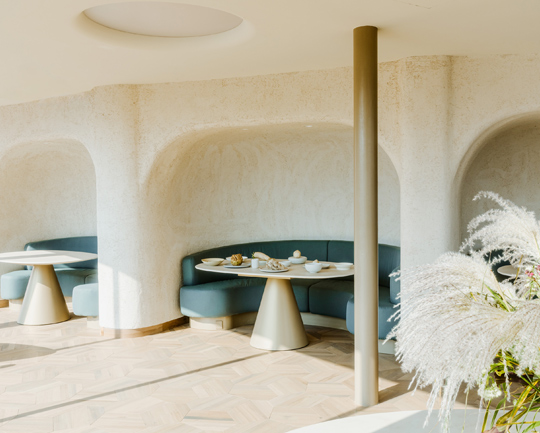
As for the furnishings, Horto has selected elements that combine aesthetic quality and the use of natural materials, favouring Italian companies while also opening to international realities, in tune with the identity of its city, Milan, a showcase of Made in Italy and concurrently the world capital of design. These elements include chandeliers by Moooi for the show-cooking restaurant, chairs and outdoor tables by Ethimo, Flos table lamps, tables by Cassina, chairs and tables by Artisan, armchairs by Arper, designed by the protagonists of nowadays and yesterday’s design including Charlotte Perriand (Cassina), Matteo Thun, Antonio Rodriguez and Mattia Albicini (Ethimo), Salih Teskeredžić and Regular Company (Artisan), Lievore + Altherr Désile Park (Arper).

THE ENVIRONMENT: THE LANDSCAPE
The terrace features a landscape project with a horizontal development, conceived by the architect and teacher Raffaella Colombo, aimed at raising awareness on minute landscapes, biodiversity and environmental fragility through an immersive and unconventional experience. Horto’s landscape moves away from the desire to amaze and approaches the idea of making a dynamic and changing scenery accessible in the heart of Milan. The project celebrates, in a contemporary key, the history of the Italian mediaeval garden, characterised by a strongly geometric and rigorous design contrasted by a totally inhomogeneous plant world, left free in its vegetative development.
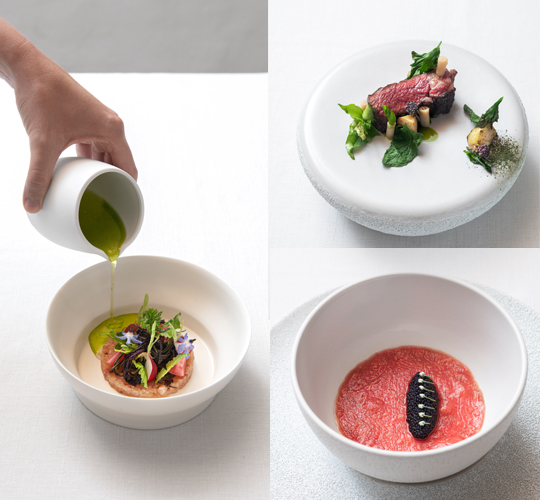
“The colours, the vegetational assemblies, the botanical harmonies and imbalances will change spontaneously and seasonally, including periods of stasis, where dead essences and mixed mantles are constantly developing while remaining walkable, allowing guests to dine on them. On the terrace of Horto you will immerse yourself in what is delicate, so as to reveal the most intimate and secret sensibilities of the recreated landscape and enjoy culinary excellence in a more relaxed way”, says Colombo.
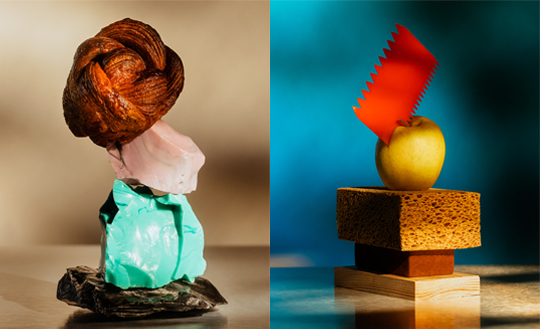
 1.06K
01/07/2025
1.06K
01/07/2025
VIVERE GROUP INVITES YOU TO "DESIGNED FOR LIFE" AT ICE BSD
VIVERE Group Invites You to "Designed for Life" at ICE BSD from July 2-6, 2025: inspiring design talks, live entertainment and networking
read more 1.13K
01/07/2025
1.13K
01/07/2025
ADRIAN GAN – MENENUN GAGASAN
Simak perbincangan eksklusif kami dengan Adrian Gan seputar memaknai ruang kreatif dalam Menenun Gagasan.
read more 26.66K
03/06/2025
26.66K
03/06/2025
PAOLO CASTELLI @ MILANO DESIGN WEEK 2025
The opening of Paolo Castelli's Milan showroom during Milano Design Week 2025 showcases a collection that blends Castelli's elegance, tradition, and...
read more 12.05K
17/06/2025
12.05K
17/06/2025
JAIPUR RUGS X PETER D’ASCOLI PRESENTS THE GILDED AGE COLLECTION (2025)
The Gilded Age collection by Jaipur Rugs X Peter D’Ascoli channels the decadent glamour of 19th-century design into bold, hand-knotted rugs that exude...
read more 74.59K
10/01/2025
74.59K
10/01/2025
W RESIDENCE IN SOUTH JAKARTA BY MICHAEL CHANDRA
Michael Chandra, founder of MNCO Studio Design has created the W Residence with an aesthetically pleasing, practical, and pleasant home from all...
read more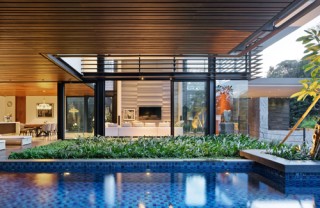 33.40K
16/05/2017
33.40K
16/05/2017
A Spellbinding Dwelling
Rumah milik desainer fashion Sally Koeswanto, The Dharmawangsa kreasi dari Alex Bayusaputro meraih penghargaan prestisius Silver A’ Design Award 2017.
read more



